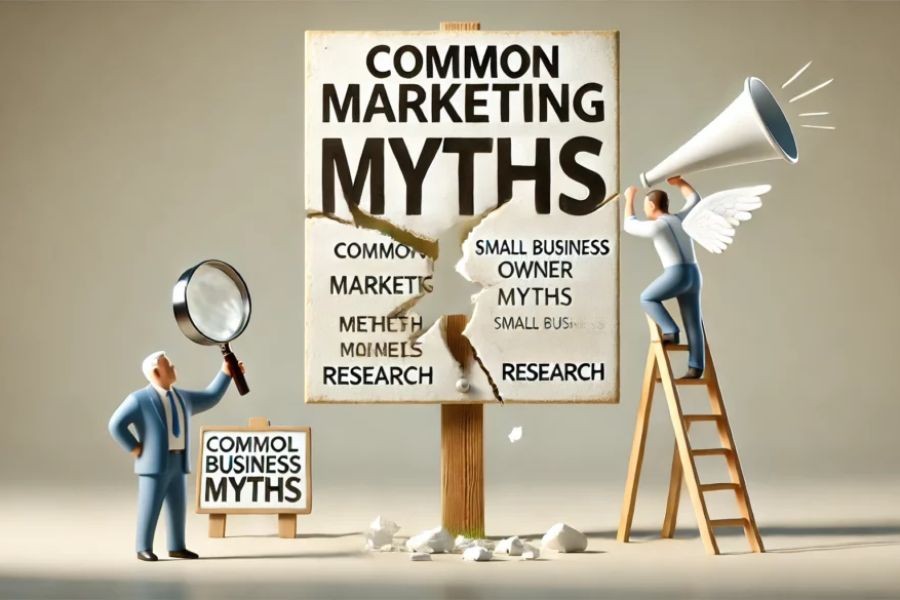Did you know that many businesses in New Zealand are unknowingly wasting resources on outdated marketing strategies due to persistent myths? Unpacking these misconceptions can unlock new growth potentials in an increasingly digital economy. In a landscape where data-driven marketing is pivotal, understanding the truths behind these myths can significantly impact your marketing ROI.
Marketing myths often persist due to anecdotal success stories, but it's crucial for Kiwi businesses to rely on data-backed insights. According to a report by Stats NZ, businesses that leverage data-driven marketing see an average increase of 20% in customer engagement.
Myth #1: More Data Equals Better Insights
Myth: The belief that more data will automatically lead to better insights is prevalent. Businesses often assume that gathering vast amounts of data will give them a competitive edge.
Reality: However, the truth is that more data can lead to analysis paralysis, where businesses struggle to make decisions due to overwhelming information. In New Zealand, small to medium enterprises (SMEs) have found that focusing on relevant data points improves decision-making and outcomes.
Example: Consider a retail business in Auckland that initially collected data from all customer touchpoints. By refining their focus to key metrics like customer lifetime value and purchase frequency, they improved their sales by 15% within six months.
Myth #2: Data-Driven Marketing is Only for Big Companies
Myth: There's a misconception that only large corporations can afford and benefit from data-driven marketing.
Reality: In fact, data-driven marketing is increasingly accessible to companies of all sizes, thanks to affordable tools and platforms. According to the Ministry of Business, Innovation and Employment (MBIE), SMEs in New Zealand that adopted data analytics experienced a 23% increase in efficiency.
Case Study: Local Cafe Chain in Wellington
Problem: A small cafe chain in Wellington was struggling with customer retention and engaged in traditional marketing methods that were no longer effective.
Action: They implemented a data-driven loyalty program using CRM software tailored to customer preferences and purchasing habits.
Result: Over the next year, the cafe chain saw:
- Customer retention increased by 30%
- Sales grew by 25%
- Customer satisfaction scores improved by 20%
Takeaway: This demonstrates that even small businesses can leverage data to enhance customer loyalty and business growth.
Myth #3: Data Guarantees Success
Myth: Many believe that simply having data will ensure marketing success.
Reality: Success hinges not just on data, but on how effectively it is analyzed and applied. Data without actionable insights is akin to navigating a ship without a compass.
Example: A New Zealand-based tech startup initially relied solely on data for decision-making. It wasn't until they integrated qualitative insights from customer feedback that they saw a 40% increase in product adoption.
Myth #4: Personalization is Not Important
Myth: Some marketers believe that personalization isn't crucial and that a one-size-fits-all approach is sufficient.
Reality: Personalization is not just important—it is essential. Data from Reserve Bank of New Zealand indicates that personalized marketing campaigns can increase conversion rates by 29%.
Case Study: E-Commerce Platform in Christchurch
Problem: An e-commerce business in Christchurch faced declining conversion rates.
Action: They introduced personalized product recommendations based on previous customer behavior.
Result: Within three months, they observed:
- Conversion rates increased by 35%
- Average order value rose by 20%
Takeaway: Personalization can significantly enhance user experience and business outcomes.
Pros and Cons of Data-Driven Marketing
Pros:
- Higher ROI: Businesses report a 30-50% increase in revenue.
- Proven Effectiveness: Supported by real-world case studies and industry-backed data.
- Long-Term Benefits: Leads to better sustainability and competitive advantage.
Cons:
- Initial Costs: Requires upfront investment before seeing significant returns.
- Industry Variability: Results can vary depending on market conditions and execution strategy.
- Privacy Issues: AI-driven approaches can raise data protection concerns among consumers.
Final Takeaways
- Data-driven marketing is accessible and beneficial for businesses of all sizes, including SMEs in New Zealand.
- Personalization and targeted strategies significantly enhance customer engagement and conversion rates.
- Effective data analysis is crucial; data alone does not guarantee success.
- Businesses should focus on actionable insights rather than overwhelming quantities of data.
Conclusion
Ready to transform your marketing strategy? By debunking these myths, your business can unlock new potential in today's data-driven world. Engage with the latest tools, focus on relevant data points, and personalize your approach to stay ahead of the competition.
What marketing myth surprised you the most? Share your insights below!
Related Search Queries
- Data-driven marketing strategies for small businesses
- Benefits of data analytics in marketing
- How to personalize marketing campaigns
- Common marketing myths debunked
- Impact of data-driven marketing in New Zealand






































CornellPid
2 months ago